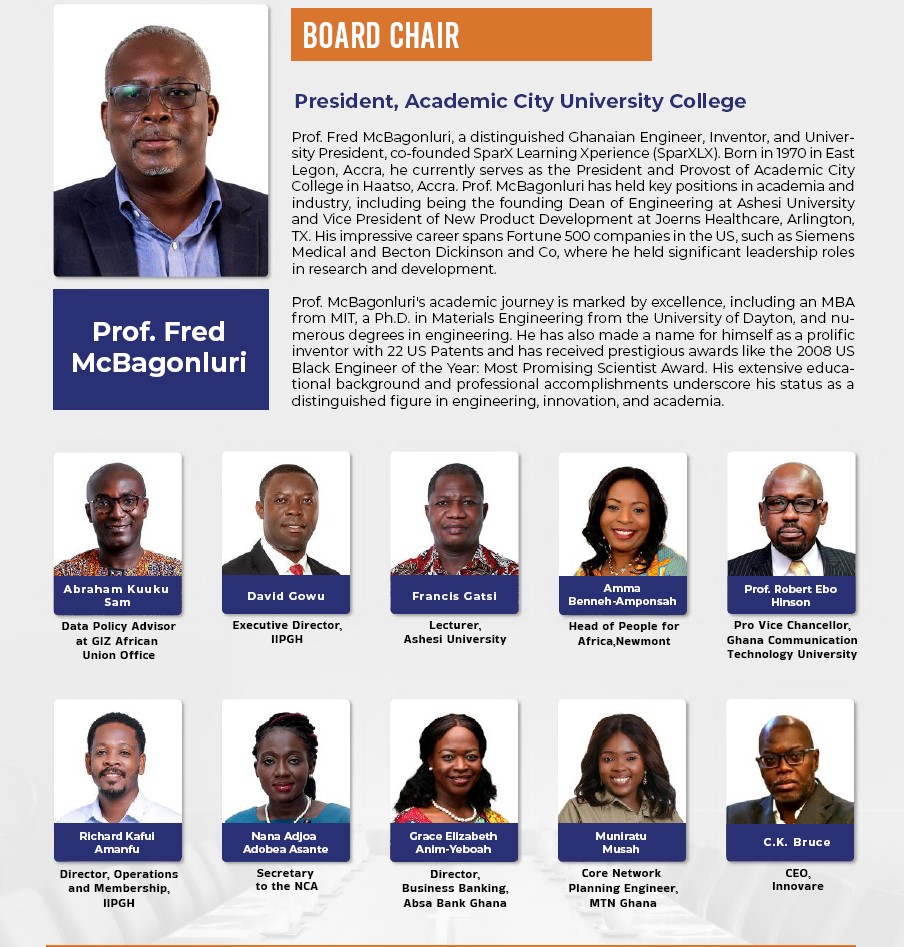
- The Executive Council shall be the highest decision making body of the Institute. It shall consist of elected directors, one from each domain, accomplished ICT professionals from Industry or Academia to be appointed by the Institute, and the Executive Director. All elected and appointed Executive Council members shall serve on the Executive Council for a maximum of three (3) terms. The Executive Council has the power to appoint and also to terminate the appointment of the Executive Director.
- The role of the Advisory council shall be to advise the Executive Council on plausible actions to take in complex situations, suggestion for improvement and as such shall be a mechanism for involving key stakeholders who may not be part of the Executive Council.
The Advisory Council comprises representatives of:
- Industry Associations such as:
- Ghana Chamber of Telecommunications (GCT)
- Broadband Communications Chamber
- Wireless Application Service Providers’ Association of Ghana (WASPAG)
- Ghana Internet Service Providers’ Association (GISPA)
- Those in TV and Radio
- Those in Oil and Gas, Marine and Aviation IT and Telecommunications
- Sister and Partner Associations such as:
- Ghana Institution of Engineers (GhIE)
- Information Technology Association of Ghana (ITAG)
- The Institute of Engineering and Technology (IET)
- The Institute of Telecommunications Professionals (ITP)
- The GSMA
- The Commonwealth Telecommunication Organisation (CTO)
- Academia
- Government Agencies such as
- National Information Technology Agency (NITA)
- Ghana Investment Fund for Electronic Communication (GIFEC)
- National Communications Authority (NCA)
- Ministry of Communications (MoC)
- Relevant Labour Unions
- Any other persons that will help advance the cause of the Institute.
- The Executive Director, who is also a member of the Executive Council, is either a Director or a hired employee tasked with the responsibility of managing the affairs of the institute on behalf of the Executive Council.
- The role of the Executive Director is at par with a Chief Executive Officer (CEO). Being a technology institute, this role shall have some elements of a Chief Operating Officer (COO).
- It is noteworthy that the Executive Director as a role is not the same as the term ‘executive director’ used when a director of an organisation works in that establishment.
- The Working Groups are the Institute’s means of forming teams to plan and implement tasks either as project or operations. They are therefore adhoc (shall be dissolved after their mandate is fulfilled) or permanent.
- A society is an area of recognized technical expertise which a member can associate with. Society membership affords members of the Institute the opportunity to deepen their knowledge in a specialty in order to gain certification in that area and be recognized as a specialist.
- The Institute shall develop the societies organically over time, and any member can recommend the formation of a Society by writing to the Executive Council stating clearly the intended goal of the proposed Society for consideration by the Executive Council.
- The Institute plans to build a strong female wing that will be the vehicle for influencing the participation of girls and women in the ICT industry in Ghana.
The Institute shall create a female wing which shall be called Women In ICT (WII).
- Any female member of the Institute automatically becomes part of the Women In ICT group
- The Women In ICT (WII) shall elect its Chair and Secretary.
- The Chair and Secretary shall have tenure of three (3) years after which they may stand for re-election.
- Eligible voters of Women In ICT elections shall be all female members of the Institute in good standing.
- In addition to Women In ICT group, all female members may join societies that match their domain of practice and professional interests.


